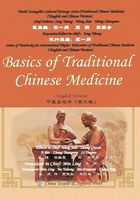
Content Summary
Basics of traditional Chinese medicine(TCM)is the subject about the basic theories, basic knowledge and basic thinking methods of TCM, the basis of other basic and professional courses, and the main course of TCM curriculum system.
This book consists of nine chapters, including the introduction, philosophical basis of TCM, zang-fu manifestation, essence, qi, blood and body fluid, meridians and collaterals, etiology, disease occurrence, pathogenesis, principles for health nurturing, disease prevention and treatment. Each chapter has a chapter summary and review questions for the convenience of the students.
The introduction mainly introduces the disciplinary attributes of TCM, and the TCM theoretical system including its formation, development and basic characteristics. The philosophical basis of TCM is mainly the yin-yang theory and the theory of five elements, which are applied to understand life activity patterns, explain pathological changes, and then guide diagnosis and prevention of diseases in the course of the formation and development of TCM.Zang-fu organs are the main part of the structure and functions of human body.Zang-fu manifestation mainly studies the physiological functions of human organs and their mutual relations, and so it is the core of TCM basic theories.The theory of essence, qi, blood and body fluid focuses on formation and metabolism of essence, qi, blood and body fluid, and their relationship with the functions of zang-fu organs.Meridians and collaterals connect the human body into an organic whole, and the theory of meridians and collaterals elaborates the composition, circulation and physiology of meridians and collaterals.There are many factors causing diseases.Etiology studies the nature, pathogenic features and clinical manifestations of different pathogenic factors.Pathogenic factors in TCM include six pathogenic factors, epidemic pathogenic factor, internal injury by seven emotions, improper diet, imbalance between work and rest, phlegm and fluid retention, blood stasis, trauma and so on.The theory of disease occurrence is the study of pathways, categories, mechanism, basic principles and influencing factors of diseaseoccurrence.Pathogenesis refers to the mechanism of occurrence, development and changes of diseases.The process of disease is complex and associated with various levels of the body, so the pathogenesis should be studied at different levels, and it mainly focuses on the basic one in TCM basic theories.Health nurturing in TCM is a systematic theory aiming to study the laws and methods of enhancing vitality and prolonging life under the guidance of TCM theories.The prevention in TCM refers to take measures to prevent occurrence and development of diseases.Therapeutic principles are the criteria of treating diseases, including routine treatment and contrary treatment, treating fundamental aspect and treating incidental aspect, reinforcing healthy qi and eliminating pathogenic factors, regulating yin and yang, treating in accordance with three factors and so on.The principles for health nurturing, disease prevention and treatment are formulated under the guidance of TCM theory of wholism and treatment based on syndrome differentiation, and have general guiding significance for choosing therapies, prescriptions, medication and acupuncture treatment in all clinical specialties.